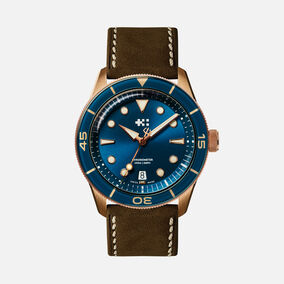Our latest Challengers are taking on the Atlantic Ocean in a boat the size of a telephone box
Sailing the Atlantic is challenging enough in a full-sized yacht. Now imagine doing it in a rowing boat. But that’s the task new CW Challengers Andy Hodgson and Rosalind Chaston have taken on in their ambitious Atlantic Escapade project.
This month, they’ll row unassisted from the Canaries to the Caribbean (a distance of 3,000 miles), to raise money for the RNLI and CW’s charity partners Blue Marine Foundation. Here, we talk to Andy and Rosalind about preparing for the great adventure.
Hi guys. Before we talk about your trip, tell us about yourselves…
Andy: I’m a pretty ordinary bloke! In terms of rowing, I rowed the coast of Great Britain in 175 days. I was done with it – then I met Rosalind! I still had the boat, they’re hard to sell, and she convinced me to come out of retirement to cross the Atlantic. So here we are!
Rosalind: It’s my fault. We’re a couple and have been together for three years. I finished university a year and a half ago
– I did oceanography and now work in science education. When Andy told me about his row around Britain, I thought it sounded like the most fantastic thing to do.
Why the Atlantic crossing?
R: We’re looking forward to crossing the ocean by ourselves – it’s the sense of achievement.
A: Two things make the trip worth it: first, getting stories for the ‘old people’s’ home. Second, there’s this weird thing about pushing yourself beyond what you think you’re capable of – it gives you rewarding experiences you can draw from in the rest of your life.
“Most of the time, it’s row, eat, sleep and repeat”

What will an average day be like?
R: Almost every day is the same. You prepare for sudden moments of excitement. But most of the time, it’s row, eat, sleep and repeat. The boat will be moving 24 hours a day: if one of you is on the oars, the other will be sleeping.
A: Our training optimises our performance. But because we’re a couple, we don’t just want to meet in the doorway. So 9am-9pm will be two hours on/two hours off – grinding it out.
R: In the two hours off, you’ll make water with the water-maker, stretch, rest, recover, make your food and get your sleep in. Then up for your next shift!
What are the sleeping arrangements?
R: We’ll be rowing and sleeping separately during the night, but doing longer shifts.
A: The only time we’ll be in the cabin asleep together – which is the same volume as a telephone box – is if we’re storm-bound. Then we’ll have to put the parachute anchor out.
Does the boat have a roof?
R: It’s a supersize rowing boat with a covered cabin at each end. When you’re rowing you’re out in the sun or rain: that’s why we’ve had to build up our ability to row in the heat.
Does the trip scare you?
R: It does! But I’m willing to be scared. Andy’s worried about the swell, I’m concerned about the discomfort. When you’re rowing, it’s fine, but when you come off your shift, you’re covered in salt, and you can’t sleep. Those moments will challenge me the most.
A: The conditions worry me. There was some pretty heavy stuff on my trip around Britain. I was caught in force eight and nine gales at one stage. There’s a feeling of helplessness – it’s like walking down the shops and the ground swallowing you up. If the boat rolls over, which happens to some teams, will suppressed trauma from the round-Britain swallow me up? Or will I be able to say: “I’ve been here before, I can deal with this?”
If the boat rolls over, what happens?
R: They’re self-righting, so it should pop straight back over.
A: The conditions worry me. There was some pretty heavy stuff on my trip around Britain. I was caught in force-eight and nine gales at one stage. There’s a feeling of helplessness – it’s like walking down the shops and the ground swallowing you up.
How do you do the day-to-day stuff: eating, going to the loo, washing?
R: The toilet situation is ‘bucket and chuck it’! We have a nice yellow bucket – a loo with a view! Food – we have freeze-dried packs: just add water and ‘enjoy’
A: Washing is every eight-year-old’s dream. There’s no Sunday bath night. Some people have taken wet wipes, but there’s a pollution problem with them. So it’s a saltwater wash or nothing at all. The freshwater you make from the solar-powered water-maker is too precious to waste on washing.
What’s the training been like?
R: We’ve been doing physical training in the gym. It’s mostly about injury prevention. When you’re rowing in the waves, you can’t get a clean stroke, so it’s about building up the stabilisers. We’re also doing on-water training, which builds up procedures and routines, so they’re second nature. We’ll be doing sea survival and sea navigation courses and working with a sports psychologist to build the communication side.
How many miles a day will you do?
R: Between 60 to 100 on a good day. You have the currents with you, plus the trade winds have set in from the Canaries. The world record is 43 days. We’re aiming for 42 and a half.
And you’ve been given a Christopher Ward watch as part of joining the Challenger programme?
A: Yes, the C60 Sapphire – a great mix of rugged and beautiful that feels more than capable for the challenge ahead. Also, the Trident seconds hand is cool and I feel confident when I wear it, too.
atlanticescapade.com


Sign up to Loupe magazine
Loupe is Christopher Ward’s quarterly in-house magazine. If you want to know what’s happening at CW (and you love great journalism), this is where to start. Alternatively, you can read all our back issues on your computer, tablet or phone.
Order your free copyRead Loupe online


